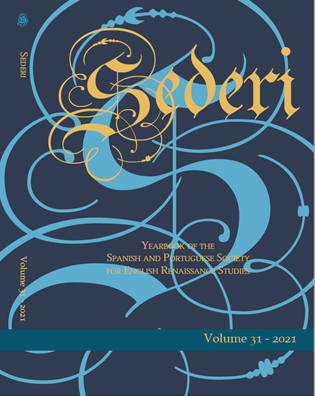Mending “the injurie of oblivion”: “Englishing” Chaucer and Barbour in early printed editions
Keywords:
Thomas Speght, Andro Hart, Early Modern Printing, Anglicization, Older Scots, Scottish printingAbstract
This article examines the editorial and design choices made in Edinburgh printer Andro Hart’s 1616 Middle Scots edition of John Barbour’s Brus. Comparison of the 1616 Hart edition with Thomas Speght’s 1602 Chaucer edition displays similar concerns with preserving accessibility to historical texts despite Scots and English language change, noting shared techniques for surmounting this problem. Linguistic assessment comparing Hart and Speght’s editions to their parent texts highlights commonalities in editing style. Hart’s edition thus portrays both a genesis of mutual intellibility between Scots and English, and a coda for Middle Scots as a literary prestige tongue.
Downloads
Downloads
Published
Issue
Section
License
The copyright holder of the published contributions is SEDERI.The hardcopy and an open-access version of the journal will be published simultaneously. The issues will be available online in the SEDERI website (http://www.sederi.org/yearbook/) and other repositories that have signed an agreement with SEDERI.
The authors who publish with this journal agree to the following terms:
a) SEDERI retains copyright of the essay.
b) If the author wishes to republish or rewrite the essay for another journal, or include the essay published in SEDERI in their personal repositories, or in any other way, they should contact the editors to obtain permission to do so. This will entail citing SEDERI as the original source and sending the editors a copy of the new version, or the link to the website, in case of online publishing.
The author(s) hereby warrant(s) that:
a) The essay submitted for publication is an original creation and does not infringe any copyright or property right of another journal, author or publisher.
b) The essay submitted for publication has not been previously published, whole or in part, and is not being considered for publication elsewhere.
c) Written permission has been obtained for any material from other sources included in the essay submitted for publication.




